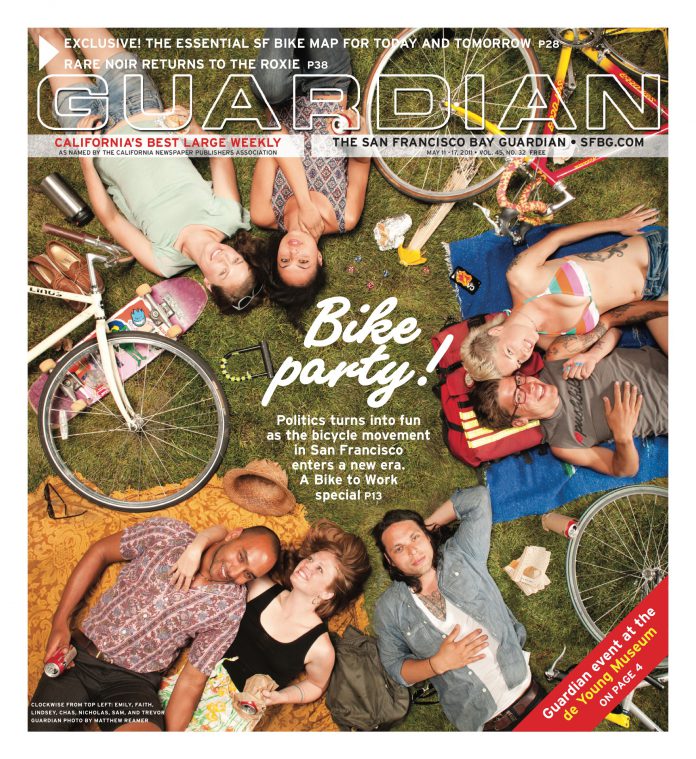arts@sfbg.com
THEATER Taking ownership of their own image as Irish folk is not a thought that occurs to any character in Martin McDonagh’s The Cripple of Inishmaan. The cranky rural inhabitants of the titular island — one of three hardscrabble Aran Islands off Ireland’s west coast — are more likely to assure themselves that Ireland “can’t be that bad” if others seem to think so. Nevertheless, image-making and self-image, both individual and collective, are important themes bandied about in the London-reared Irish playwright’s dark comedy, which is set in the early 1930s, just as American filmmaker Robert J. Flaherty and his Hollywood crew are shooting the 1934 pseudo-documentary feature, Man of Aran, on neighboring Inishmore.
The thematic shading as well as the humor, reluctant compassion, and musicality in McDonagh’s 1996 play are all shown off to fine effect in the current touring production by Ireland’s renowned Druid Theater Company, coproduced by New York’s Atlantic Theater and running through this weekend at UC Berkeley’s Zellerbach Playhouse. If neither the play or production achieve the surpassing power and beauty of Druid’s last offering in 2009, Enda Walsh’s The Walworth Farce, this is still a worthwhile show, especially for people intrigued by relatively recent and fairly strong productions at the Berkeley Rep of McDonagh’s The Lieutenant of Inishmore (another in the playwright’s Aran Islands trilogy) and The Pillowman.
Druid’s cofounder Garry Hynes, an early and enthusiastic champion of the playwright-turned-filmmaker (writer-director of 2008’s Academy Award–nominated In Bruges) who took home a Tony for Druid’s staging of McDonagh’s The Beauty Queen of Leenane, directs her fine cast with admirable assurance. Indeed, her Cripple of Inishmaan takes ownership of the material without sentimentality, but rather in perfect sync with the brutally honest humor that signals as it sidesteps an underlying sweetness and sorrow.
The story centers on titular hero “Cripple Billy” Claven (the supple, slyly charismatic Tadhg Murphy), a kind-hearted bookworm with a misshapen right foot and hand who desires to secure himself a part in the Hollywood production and escape his treeless island burg. It’s a plan that inspires much ribald laughter from his fellow villagers who can only see Billy — an orphan raised by the two spinsters (Ingrid Craigie and Dearbhla Molloy) who run a half-stocked general store, in which cans of peas are over-represented and eggs and sweets at a premium — as a hopeless, ugly simpleton. Included in this consensus is Slippy Helen (a vivacious Clare Dunne), a disheveled, foul-mouthed yet majestic beauty with a pronounced violent streak who is Billy’s secret love interest.
Billy is plagued by a sense of guilt over the deaths of his parents, who died on the sea in an apparent suicide (a story that has more than one permutation as the play progresses), leaving him as an infant on the shore to be scooped up by local gossip-monger Johnnypateenmike (Dermot Crowley). Billy nevertheless exudes a confidence that belies his background, his handicap, or the general self-deprecating opinion of Irish life by those living it around him.
In the mouths of Hynes’ actors, the coarseness and banality of that life becomes more than an occasion for much humor. In subtle contrast to the self-effacing language of insult and pettiness, it becomes a kind of brilliant naïve music. The opening dialogue between Billy’s aunties, for instance, recalls Beckett as the two women, waiting anxiously for Billy’s return, pass the time side-by-side behind a long freestanding counter, facing blankly out to the audience as they trade a volley of simple lines about a “bad arm” as if the subject were a ping-pong ball, setting up a rhythm that is its own message and meaning, an idle sport marking time in the cadence of a children’s nursery poem.
If looks and words are deceiving here, so too are the initial impressions we have of Billy in others’ eyes: there are layers of unacknowledged perception at work between these characters. We, of course, see right away that Billy, despite an inflated reputation for cow-staring, is anything but vacuous. Indeed, he is easily the island’s most decent, intelligent, and charming inhabitant. And Murphy plays him with a long-suffering cool in which a sweetness and determination will not be silenced, as well as an offbeat physical grace. His Billy shuffles across the floor with a habitual ease that has something like a joy in it, something between a sashay and a swagger, as if he were a jazz musician stroking a set of brushes over a snare top.
The Cripple of Inishmaan makes good sport of the notion of superiority, moral or otherwise, in rural life. Taking his cue from the historical moment flagged and deceptively packaged by Man of Aran (whose depictions of traditional Aran life were in many cases already antiquated by the 1930s), McDonagh wrests his subjects from the premodern caricatures in Flaherty’s stagy documentary. (A late scene has the characters, sans Billy, gathered to watch the completed Flaherty film, marveling with some frustration at a slow-to-unfold shark-hunting sequence as if it were from another world altogether.) McDonagh, however, a boyhood visitor to the region but otherwise a life-long Londoner, does so not exactly in the name of realism, since his comedy is hardly an effort at documentary and trades in caricatures of its own. At the same time, while taking a contagious delight in mocking certain ethnographic and nationalist pretenses, he lets us glimpse in his characters a compassion — heavily guarded beneath an otherwise hearty brutality — that does not lie.
THE CRIPPLE OF INISHMAAN
Wed/11–Fri/14, 8 p.m.; Sat, 2 and 8 p.m.; $68
Zellerbach Playhouse
UC Berkeley, Bancroft and Telegraph
(510) 642-9988

